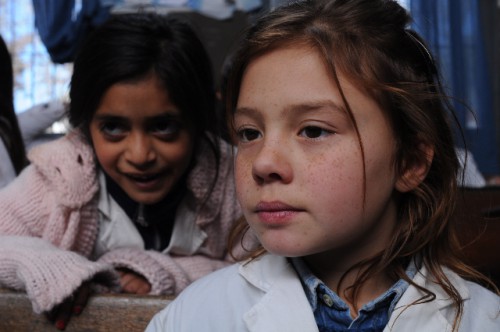Film Review: El Premio and Tambien la Iluva at the Cornerhouse’s Spanish and Latin American film festival
Article published: Tuesday, March 27th 2012
The Cornerhouse’s annual Spanish and Latin American film festival has returned with a selection of films, documentaries, art, and live events aimed at showcasing the interesting work being produced by Spanish and Latin American filmmakers. Oli Rahman reviews El Premio and Tambien la IIuva.
El Premio
 Argentinian film “El Premio” is a melancholy tale of exile and paranoia that follows feisty young Cecilia (Paula Galinelli Hertzog) and her mother Lucia (Laura Agorreca). As Cecilia starts at school, her withdrawn mother hides herself away in a remote beach-house. Director Paula Markovitch describes it as an autobiographical story that expresses the difficulty of growing up in a fascist era, a time when “my family’s safety depends on my silence”.
Argentinian film “El Premio” is a melancholy tale of exile and paranoia that follows feisty young Cecilia (Paula Galinelli Hertzog) and her mother Lucia (Laura Agorreca). As Cecilia starts at school, her withdrawn mother hides herself away in a remote beach-house. Director Paula Markovitch describes it as an autobiographical story that expresses the difficulty of growing up in a fascist era, a time when “my family’s safety depends on my silence”.
The audience is left in the dark as to the reasons for the mother and daughter’s exile, or the whereabouts of Cecilia’s father. Perhaps he is a political refugee? Maybe the family are involved in the production of anti-fascist literature? Why was Ceci’s cousin killed by the army? Answers to Cecilia’s questions are few and far between- Markovitch is more interested in atmosphere than plot.
The scenes set in Cecilia’s school are perhaps the most interesting, as they have the majority of the dialogue, and some very believable (and funny) child actors. The relationship between Cecilia- whose intelligence gets her noticed at school- and her mother is poignant, and the audience identifies with Cecilia’s hunger for Lucia’s approval.
Although El Premio is effective in capturing the sense of unease and paranoia experienced by those living in a police state, the film suffers from too many self indulgent landscape shots, that linger in a way that verges on frustrating. Constant howling wind fills the void left by a lack of dialogue, which is frustrating. And the meandering narrative has a stop-start feel, with various plot trails that build up steam and then fizzle out, which left me in turns irritated, disoriented, and bored. The actors are good but never get a chance to prove it – Markovitch is far more interested in trying the audience’s patience with symbolic shots of tumbleweed and deserted beaches.
Tambien la Iluvia (Even the Rain)
 Tambien la Iluvia is an altogether different animal, and follows a production crew in Bolivia as they attempt to shoot a film about the exploits of Christopher Columbus. Filming is made problematic by the decision of the young director Sebastian (played by Gael García Bernal) to cast, against the warnings of his producer Costa ( played by Luis Tosar), a charismatic local called Daniel (played by Juan Carlos Aduviri) as Hatuey, a key character in the Indian rebellion. In the course of filming Daniel becomes increasingly involved in the political struggle against the privatisation of water, and acts as the microphone-toting inciter of rebellion among the Bolivian workers.
Tambien la Iluvia is an altogether different animal, and follows a production crew in Bolivia as they attempt to shoot a film about the exploits of Christopher Columbus. Filming is made problematic by the decision of the young director Sebastian (played by Gael García Bernal) to cast, against the warnings of his producer Costa ( played by Luis Tosar), a charismatic local called Daniel (played by Juan Carlos Aduviri) as Hatuey, a key character in the Indian rebellion. In the course of filming Daniel becomes increasingly involved in the political struggle against the privatisation of water, and acts as the microphone-toting inciter of rebellion among the Bolivian workers.
Alongside Sebastian’s film a documentary about the production of the film is also being made, which gives Tambien a rough and ready feel; constant switches between handheld and mounted cameras draw us into the world of filmmaking and creates the feeling of being a member of the crew.
The film hurtles along thanks to a witty and well-paced script, which the cast does a good job at bringing to life. Director Icíar Bollaín draws an interesting parallel between Columbus’s discovery and colonization of the New World and the process of modern filmmaking in foreign countries, with some beautiful comic scenes involving the drink-sodden actor playing Columbus and menacing shots of the Bolivian cityscape. As tensions rise the violent scenes of civil unrest are entirely believable, and I found myself sympathising with the actors who wish to escape the uprising. Critics have been keen to attack the inherent hypocrisy in making a film about the exploitation of locals that may well have exploited locals in the process, yet this line of attack seems too obvious: the problem with Tambien la IIuvia is that it verges on heavy handed when discussing politics.
The film’s weak points are definitely thematic rather than to do with execution. For example, the privatization storyline is presented along rather simplistic lines as “water company = bad, workers = good”, which may irritate viewers who have an interest in uncovering the complexities of the dispute. The motif of water representing life also wears a little thin towards the end, and there is a female character who gets no characterisation whatsoever until she becomes an important plot device.
Minor gripes aside, Tambien la IIuvia is well paced, has engaging characters, a fantastic soundtrack, and left me wanting to learn more.
Oliver Rahman
Comments
No comments found
The comments are closed.



